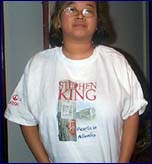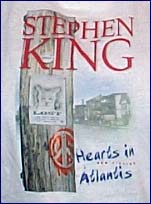A Rubix Cube gathers no...
Ladies and gentlemen, sit back. Relax. Enjoy the show. But first, a little teaser. A brain teaser. Massage that grey matter!
|
The Introduction:
Swiss mathematician Leonhard Euler used the term "Latin Square" to refer to a square filled with letters of the Latin alpabet in which each letter appears exactly once in each row and column. The Latin square on this page go Euler one better. To solve, fill in the spaces with letters from A to F so that every letter appears exactly once in each row, each column, and each colored region. (Feel free to email me if you have any questions.) |
The Puzzle:

|
|
The Prize:
Well, as any person who admires fellow puzzlers, I believe there must be some sort of reward or recognition for the people who solve the puzzle. Email me a solution, along with your name (or other moniker) and your URL (if you have one). Those who get it correct will get a personalized "I Solved It" (or some other similarly cheezy slogan) graphic from me as well as my congratulations and a gratuitous link in a future entry for solving the puzzle.
This puzzle (and more like it) can be found in the current issue of Games Magazine. Thank you Mark Thompson for a wonderful challenge!
|
Why the puzzle?
I solved it the other day. I enjoyed the challenge so much and it's not, in my view, too difficult. It is the first of six. I did the first one on my own, could do parts of the second and third puzzles (and could finish with some assistance), but that was it. It's a three star puzzle and getting even the first of six is not a common thing for me. So, I was especially proud to solve it and I thought that you might want to give it a go.
---
I knew that I would be faced with mountains of work today, so I tried to leave as early as I could. That backfired on me because, despite getting out the door in ample time for my bus, it arrived early and drove past my stop without a moment's hesitation. I was only about 60 feet away, which made me irritable for a minute while I decided what to do. Go back home and wait for twenty minutes for the next bus? Stand on my usual stop and try desperately not to look like a hooker? (In my neighborhood, no one would suspect me of that even if I wore extremely provocative, sleezy clothing. Upscale suburbia probably has prostitutes but definitely none of the corner variety. That I can see, atleast.)
I decided to walk to the nearest official "bus stop". My corner is technically a "bus stop" since when I stand there, the bus will stop for me, but it's not listed on the time schedule map. The closest official bus stop is a 5 minute walk from my place and has some nice benches. I looked down at my sandaled feet and my cosmic green nail-polished toes. It was way too cold to say in one place and the walk would do me good.
Once I got to the stop, I realized that I should have ducked into one of the coffee or bagel shops on the way. I had over 15 minutes more to wait for the bus and I would spend it sitting on a cold bench, unsheltered by the wind in open-toed sandals. Brilliant. I buried myself into 3001 with little success, muttering castigations at myself.
Thankfully, the next bus arrived early.
---
Work was incredible, in not so good of a way. Mounds of material to sort through and, even worse, we all didn't really understand the project. We (myself, my designer coworker and our Information Architect boss) and found ourselves wriggling around how part A or part B of the application worked. We'd turn to each other and shrug our shoulders with clueless looks on our faces. Yuck.
Thankfully, the designer and I were able to sort through the mess by the time evening came around. We're cutting it very close to the wire (the presentation is at 2pm tomorrow), but I think we'll make it. It still was very unpleasant sorting through the iterations and changes that have filtered down the ranks to us. We hope we've got it right.
---
 I got a prize in the mail today.
I got a prize in the mail today.
I wish I could say it was unexpected, but the Simon & Schuster emailed me a week or so ago telling me that I was one of the lucky winners to receive a t-shirt and deck of playing cards for answering five questions properly about Hearts in Atlantis, the Stephen King book I purchased and sped through a few months ago. That was a very welcome surprise. When the Green Mile sweepstakes were around, I was one of the winners three or four out of the six competitions since I bought the books and tore through them in order to get the answers to the questions they would post the same day the books were released. They would only give prizes to the first few responders. Once I started working, I thought that any future contests wouldn't be available to me (I was a student during the Green Mile competitions) since I would miss deadlines when I worked. Thankfully, this competition didn't have that sort of frenzied hustle for the first few entries. I think.
---
One last thing before I go to bed:
I finished 3001 tonight on the bus ride home. It was good, but it wasn't exactly continuous from 2061, which irked me. I like consistency in a series from one book to the next. I like it when an author doesn't change facts around. Unfortunately, Clarke changes his facts around. What happened to Heywood Floyd at the end of 2061 wasn't answered in 3001. That was very bothersome. I also don't understand how interstellar travel is available to David Bowman through the Monoliths but not through the messages that the mini Monoliths are sending to the "Node" (which accounts for the approximately 1000 year delay between message and response).
Clarke claims that the books aren't necessarily continuous. In fact, he states that they might not necessarily be set in the same universes. I've got unanswered questions and it greatly bothered Mike because he believes it is the mark of a sloppy writer (too lazy to strive for consistency!). Clarke's attention to science detail (it's true that the books are part theoretical dissertations) doesn't seem to jive with the inconsistencies between the novels.
Oh, and he repeats whole chapters from the previous works in the series. I can understand how they are important for the people who didn't read the previous novel... but by the third or fourth time I would read a paragraph copied verbatim from the previous work, I got very irritated. I skimmed two or three chapters in 3001 alone. Ugh. The Green Mile had the same problem too, but King would say it slightly differently, so it wasn't too bad.
I'm probably going to see if I can get my hands on any other books relating to the 2001-3001 series by Clarke. In the meanwhile, I still think about House Atreides. Recommendations for any good space-themed novels?





Excerpts from Games Magazine © Copyright 1999 by Games Magazine and Mark Thompson.






